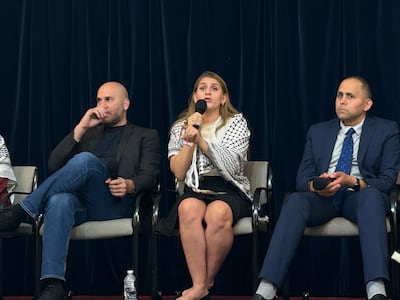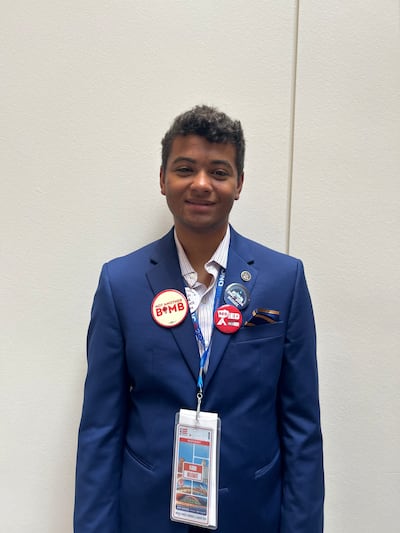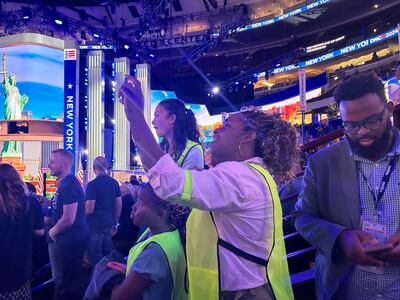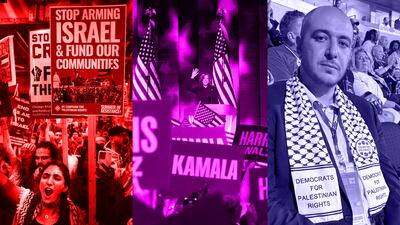“Not another bomb” pins, “Democrats for ceasefire” T-shirts and keffiyehs were among the many emblems helping to paint a picture of party priorities within the halls of this week's Democratic National Convention in Chicago.
Pro-ceasefire Democrats represented a large coalition of visible voters throughout the course of the week-long convention.
The Uncommitted National Movement, which mobilised more than 750,000 voters across the US to protest against President Joe Biden's policy on Israel, had this week pushed, unsuccessfully, for an Arab American to take the stage to speak on the war in Gaza.
On Wednesday night, uncommitted delegates staged a sit-in outside the arena demanding that their voices be heard.
“We have been asking for weeks to have a Palestinian voice up there,” Yazan Kader, an uncommitted delegate from Washington state, told The National.






























“The Democratic Party has said that they want to be inclusive of everyone – this is a big tent, and right now the Palestinian voice is outside that tent. Even though I am in this building, my voice is kept out.”
Listening to the ceasefire camp discuss their policy demands, there does not appear to be much daylight between Democrats energised by the new Harris-Walz ticket and the uncommitted movement threatening to withhold their votes from the party.
Both say they want an arms embargo on Israel, an end to Israel's war in Gaza, and a US commitment to rebuilding the Palestinian enclave and a two-state solution.
But in a conversation with David Seaton, a Democratic ceasefire delegate from the state of Massachusetts, the distinction between the Democratic factions becomes clear.
“The way to achieve a ceasefire … is electing Kamala Harris as our next president,” he told The National.
Vote Uncommitted
The uncommitted movement, however, says Ms Harris and the Democratic Party have not yet earned that confidence.
And the scope of the “ceasefire Democrats” is in part why their lack of representation at the convention is so baffling to them.
“We are asking that our US policy decisions reflect the majority of Democrats and the majority of voters … and that is not happening right now, we are not aligned,” Layla Elabed, co-chairwoman of the National Vote Uncommitted movement, said at Rainbow Push Coalition headquarters in south Chicago.
“What I'm hearing from [uncommitted] delegates, it is one of the easiest organising that they've ever had to do, because the majority of Democrats, including Harris delegates, do not want to see our tax dollars being used to kill civilians.”

But despite the word “ceasefire” being cheered many times when it was uttered on the main stage of the DNC, it would not be heard from the mouth of a Palestinian-American, despite months of efforts to bring the uncommitted movement for Gaza to the fore.
And Democratic delegates were not as eager to cheer when members of the movement held up signs in protest against US support for Israel as Mr Biden spoke on stage. Instead, they were drowned out with pro-Biden chants, with some people trying to tear down a banner reading “Stop Arming Israel”.
Ms Elabed was among those who participated in the DNC's first panel on Palestine at one of the convention's official side events.
For fellow panellist James Zogby, a long-time Democrat and Palestinian American, that is no small feat.
“People say to me … You’re just saying the cup is half full. I say ‘No, I remember when we didn’t have a cup,’ and we are now with a cup and filling it up,” said Mr Zogby, founder of the Arab American Institute who writes frequently for The National.
But especially after the main-stage speech given by Jon Polin and Rachel Goldberg, the parents of 23-year-old Israeli-American hostage Hersh Goldberg Polin – the uncommitted movement says the Democratic Party is failing to recognise Palestinian humanity to the same degree it does that of Israelis.
The movement on Thursday released text of the would-be speech its member, Georgia state representative Ruwa Romman, would have delivered.
“They said the answer is no,” Abbas Alawieh, co-founder of the uncommitted movement and a delegate from Michigan, told The National. “And I said, Is there a reason why? And they said, all we were told to tell you, is the answer is no.”
Ceasefire Democrats
Ceasefire Democrats believe there is “a lot of continuity” between the uncommitted movement both inside the convention and in the protests outside of it.
Blake Robinson, the Young Democrats of Georgia's rural caucus chair, is another delegate who supports a ceasefire.
He believes Ms Harris can serve as a bridge in peacebuilding between Israelis and Palestinians, emphasising that the Vice President has “called for a ceasefire multiple times”.
“We should look at President Harris as the person that's going to go in there and say that enough is enough … she knows how to work through diversity, and work through identities,” he told The National.

Words versus actions over Israel's war in Gaza were at the centre of party splintering at the convention – and even ceasefire delegates eager to embrace Ms Harris admitted it.
Mr Seaton, for example, has not had any conversations with leading party officials over his demands as a ceasefire delegate – and he believes there need to be.
Matt Royer, the president of Virginia Young Democrats who is organising for Ms Harris, says that Democrats “cannot take any vote for granted” but that it is difficult to fully address these conversations in the middle of the campaign.
He believes that Ms Harris “will bring a much needed shift on [Israel] policy”, he told The National, and he hopes that she will bring the uncommitted “folks back into the fold”.
“I don't think that anybody is against what they're trying to get out there,” he added.
Mr Robinson concedes that even for ceasefire delegates, there is an emphasis on broader US policy concerns.
He believes that some black Americans worry that solely focusing on the fight for Gaza is “distracting from the continued fight we've had in the United States for civil rights and human rights”.
“As a ceasefire delegate, I don't think it just means calling for a ceasefire in Palestine. I think it means calling for an end to human rights violations across the country.”
Declining to bring Palestinian voices to the main stage also saw a blow to members of the Harris-Walz coalition, including Muslim Women For Harris, a group which announced it was disbanding over it.
“The family of the Israeli hostage that was on the stage tonight has shown more empathy towards Palestinian Americans and Palestinians, than our own candidate or the DNC has,” the group said in a Wednesday statement.
Anti-DNC protests
The lack of Palestinian representation on the main stage seems to have validated the fears of organisers of the March on the DNC, who warned uncommitted delegates ahead of the convention that working within the Democratic Party process would not deliver results.
For others, the sentiment towards Democratic delegates and operatives inside the convention was much stronger.
Areej, a Palestinian-American protester, took to the streets of Chicago on Monday to give Democrats inside the convention a message: “Shame on you.”
“Shame on you for calling yourself democratic, shame on you for calling yourself a leftist, a progressive, a human-rights activist, and you fund and enable a genocide,” she told The National on the march's first day outside the convention.
Ann Wright, an anti-war activist with CodePink and former US diplomat, however, expressed a different sentiment.
“Thank God they are there,” she told The National. “I tell them, stand your ground … Now is the time to really stand solid. Keep up the pressure on the administration and on the new candidate that we have in Kamala Harris.”
For many of the Palestinian Americans protesting outside, the stakes are too high for politicking.
“Lip service can't feed my family,” said Mohamed Hussein, who told The National he has lost more than 100 relatives in Gaza.
The March on the DNC encompassed a spectrum of progressive grievances with the Democratic Party, rallying tens of thousands of demonstrators and 270 organisations.
Hatem Abudayyeh, chairman of the protest movement, said in a Wednesday statement that “organising works”, and that activists have helped to move the needle on Gaza in a way Democratic insiders have not.
The wider Democratic tent
It was only a few weeks ago that the Democratic ticket was radically different: with President Joe Biden running for re-election and Ms Harris still vying for a second term as vice president.
That historic ticket shake-up also transformed the cynicism within the party over Mr Biden's candidacy, including an increasing focus on how his support for Israel – and the growing uncommitted movement – was tanking Democratic election odds.
Pre-convention polls showed Ms Harris leading against Donald Trump 49 per cent to Trump’s 45 per cent, compared to Mr Biden in July polling at 42 per cent against Mr Trump's 43 per cent.
“The energy shift has been huge,” said Mr Royer, of the Virginia Young Democrats.
“A lot of people have been saying that this is going to be a honeymoon phase … we're really seeing that that's not the case, and we're continuing to see this momentum shift.”
For many Democrats inside the convention, Israel's war in Gaza indeed felt far away.
Tanya Virden brought her young daughter, Brooklyn, to the convention as the party rallied behind the would-be first woman president, who would also be the first person of South Asian descent to hold the office.
“It was important for me to bring her here today, just to witness history, and potentially the first woman president, especially one that looks like we do,” she told The National after a speech by former president Barack Obama.

Megan Lange spoke to The National on Tuesday night's convention floor as delegates danced to James Brown's Living in America, one of the many moments of visible joy at the DNC.
She is a delegate and executive party committeewoman for the state of Tennessee, which criminalised abortion after the Supreme Court's 2022 overturn of the landmark ruling Roe v Wade.
Ms Lange said that, as a woman in a state that saw crackdowns on her bodily autonomy, it is clear that for her that voting Democrat is a must.
But when asked about Gaza, she did not have much to add.
“I'm thankful there's been a call for a ceasefire … but it's a hard question,” she told The National.

